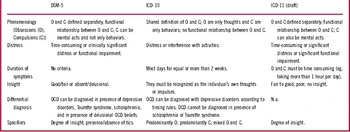
Though Pierre Janet initially posited “psychasthenic state,” as a necessary condition for the development of obsessive-compulsive symptoms, later researchers like Berg et al. Among the anxiety disorders, Obsessive-compulsive disorder (OCD) is one of the best researched co-morbid disorders, which has co-occurrence rates of 23-45%. According to an excellent recent review by Diedrich and Voderholzer the most frequent ones are anxiety disorders with a prevalence of 23-24% and affective disorders with a prevalence of 24%. wp-content/uploads/2014/09/OCPD.It is associated with multiple co-morbid conditions. Obsessive-compulsive personality disorder (OCPD). New diagnostic perspectives on obsessive-compulsive personality disorder and its links with other conditions. A comparison of obsessive-compulsive personality disorder scales. Capacity to delay reward differentiates obsessive compulsive disorder and obsessive compulsive personality disorder.

tests-procedures/cognitive-behavioral-therapy/basics/definition/prc-20013594 Switzerland: Springer International Publishing. Clinical Handbook of Obsessive-Compulsive and Related Disorders. You can learn more about how we ensure our content is accurate and current by reading our editorial policy. Healthline has strict sourcing guidelines and relies on peer-reviewed studies, academic research institutions, and medical associations. The International OCD Foundation keeps a list of support groups for those coping with OCD, OCD tendencies, and personality disorders such as OCPD.

There are multiple forums and support groups that a spouse or loved one of someone with OCPD can join. It can also be helpful for significant others and loved ones of people with OCPD to seek support for themselves. However, it can be very difficult to approach someone with OCPD about their behaviors. Most individuals that get treatment for OCPD are encouraged to do so by a spouse or loved one. They often see others as the problem instead. People with OCPD are typically reluctant to change their behaviors. limited to two or three specific areas of life.A person most likely has OCD or another personality disorder that’s not OCPD if their obsessions are: If you suspect that your spouse, partner, or family member has OCPD, pay attention to their obsessions and their compulsive behaviors. How can a spouse or loved one support someone with OCPD? What is Jacobson’s relaxation technique? » Examples of recommended relaxation practices include yoga, tai chi, and Pilates. Relaxation training involves specific breathing and relaxation techniques that can help decrease your sense of stress and urgency. Long-term prescription use isn’t usually recommended for OCPD. If you’re prescribed an SSRI, you may also benefit from support groups and regular treatment from a psychiatrist. Your doctor may consider prescribing a selective serotonin reuptake inhibitor (SSRI) to decrease some anxiety surrounding the obsessive-compulsive cycle. A mental health counselor may encourage you to put less emphasis on work and more emphasis on recreation, family, and other interpersonal relationships. These regular sessions involve working with your counselor to talk through any anxiety, stress, or depression.

#Obsessive compulsive personality disorder dsm 5 professional
During CBT, you meet with a mental health professional on a structured schedule. If you have OCPD, your therapist will likely use a three-pronged approach to treatment, which includes the following: Cognitive behavioral therapy (CBT)Ĭognitive behavioral therapy (CBT) is a common type of mental health counseling. They believe that their way of thinking and doing things is the only correct way and that everyone else is wrong. People with OCPD have no idea that there’s anything wrong with the way they think or behave. OCPD is often confused with an anxiety disorder called obsessive-compulsive disorder (OCD). They can experience anxiety that occurs with depression.They often feel righteous, indignant, and angry.

They’re hardworking, but their obsession with perfection can make them inefficient.They have difficulty forming and maintaining close relationships with others.They find it hard to express their feelings.People with OCPD have the following characteristics: People with OCPD will also feel a severe need to impose their own standards on their outside environment. Obsessive-compulsive personality disorder (OCPD) is a personality disorder that’s characterized by extreme perfectionism, order, and neatness. What is obsessive-compulsive personality disorder?


 0 kommentar(er)
0 kommentar(er)
